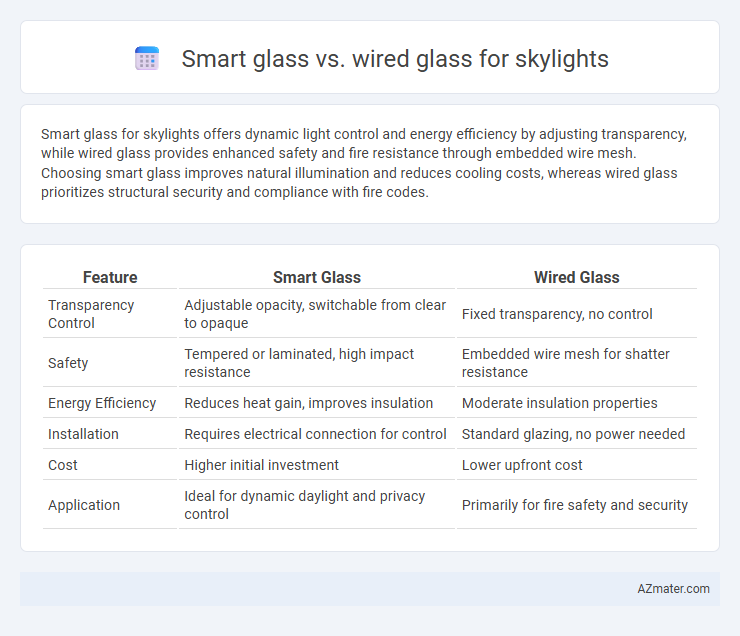Smart glass for skylights offers dynamic light control and energy efficiency by adjusting transparency, while wired glass provides enhanced safety and fire resistance through embedded wire mesh. Choosing smart glass improves natural illumination and reduces cooling costs, whereas wired glass prioritizes structural security and compliance with fire codes.
Table of Comparison
| Feature | Smart Glass | Wired Glass |
|---|---|---|
| Transparency Control | Adjustable opacity, switchable from clear to opaque | Fixed transparency, no control |
| Safety | Tempered or laminated, high impact resistance | Embedded wire mesh for shatter resistance |
| Energy Efficiency | Reduces heat gain, improves insulation | Moderate insulation properties |
| Installation | Requires electrical connection for control | Standard glazing, no power needed |
| Cost | Higher initial investment | Lower upfront cost |
| Application | Ideal for dynamic daylight and privacy control | Primarily for fire safety and security |
Introduction: Comparing Smart Glass and Wired Glass for Skylights
Smart glass and wired glass offer distinct benefits for skylights, with smart glass providing dynamic light control and energy efficiency through electrochromic technology. Wired glass enhances safety and impact resistance by incorporating embedded wire mesh, making it ideal for security-focused installations. Choosing between smart glass and wired glass depends on prioritizing either advanced light modulation or enhanced structural safety for skylight applications.
What is Smart Glass?
Smart glass, also known as switchable glass, uses electrochromic, thermochromic, or photochromic technology to control light and heat transmission in skylights, allowing users to adjust transparency for privacy and energy efficiency. Unlike wired glass, which contains embedded metal wires for fire resistance but remains static in transparency, smart glass offers dynamic control over solar gain and glare reduction. This advanced glazing technology enhances natural lighting while reducing HVAC costs, making it a superior option for modern skylight applications.
What is Wired Glass?
Wired glass is a type of safety glass embedded with a metal wire mesh that holds the glass panes together upon breakage, enhancing fire resistance and preventing shattering. It is commonly used in skylights for its durability and ability to maintain structural integrity under high temperatures. While smart glass offers adjustable transparency and energy efficiency, wired glass excels in providing robust safety features and compliance with fire codes.
Performance and Energy Efficiency
Smart glass for skylights enhances energy efficiency by dynamically controlling solar heat gain and natural light transmission, reducing reliance on HVAC systems and artificial lighting. Wired glass, while providing increased safety and thermal resistance, lacks adaptive features and permits higher solar heat transfer, resulting in less efficient temperature regulation. Choosing smart glass improves overall performance by balancing daylight utilization with energy savings in building environments.
Light Control and Privacy Features
Smart glass for skylights offers advanced light control by adjusting opacity through electric currents, enabling instant transition from clear to frosted for enhanced privacy without sacrificing natural light. Wired glass, embedded with metal mesh, provides inherent safety and moderate light diffusion but lacks dynamic control, maintaining consistent transparency and limited privacy options. Choosing smart glass maximizes customizable light management and privacy, while wired glass focuses on durability and fire resistance.
Safety and Durability Considerations
Smart glass for skylights offers enhanced safety with its ability to switch between transparent and opaque states, reducing glare and heat while maintaining structural integrity, often featuring laminated layers that resist shattering. Wired glass, traditionally used for fire safety, contains embedded metal mesh to hold the glass together upon breakage, providing excellent fire resistance but with lower impact resistance compared to smart glass. Durability of smart glass excels in adapting to various environmental conditions with minimal wear, whereas wired glass may be prone to corrosion of the wire mesh over time, impacting long-term performance.
Aesthetic and Design Flexibility
Smart glass offers superior aesthetic appeal for skylights by allowing dynamic tinting and transparency control, enabling tailored light transmission and enhanced privacy without bulky frames. Wired glass, while durable and traditional in appearance, lacks the adaptive design flexibility and modern visual sleekness of smart glass. Incorporating smart glass in skylights provides architects and designers with innovative possibilities for minimalist, seamless integration and customizable ambiance.
Installation and Maintenance Requirements
Smart glass skylights require professional installation due to their integrated electronic components and control systems, ensuring seamless operation and durability. Wired glass skylights, with simpler construction, are easier and quicker to install but may require regular inspections for wire integrity and sealing to prevent leaks. Maintenance of smart glass includes occasional software updates and electrical system checks, while wired glass demands periodic cleaning and potential replacement of damaged wires to maintain safety and performance.
Cost Comparison: Initial and Long-Term Expense
Smart glass skylights typically involve higher initial costs due to advanced technology and installation complexity, averaging between $150 to $250 per square foot, whereas wired glass usually costs $50 to $100 per square foot upfront. Long-term expenses for smart glass can be offset by energy savings and reduced maintenance, while wired glass may incur additional costs from frequent replacements and less energy efficiency. Evaluating total cost of ownership reveals smart glass as a cost-effective investment for energy-conscious building designs despite its higher upfront price.
Choosing the Right Glass for Your Skylight
Smart glass for skylights offers adjustable tinting that enhances energy efficiency and comfort by controlling light and heat transmission, while wired glass provides superior safety and fire resistance with embedded metal mesh. When choosing the right glass for your skylight, consider factors such as energy savings, natural light control, fire safety requirements, and durability. Smart glass excels in dynamic environments needing light modulation, whereas wired glass is ideal for buildings with strict fire codes.

Infographic: Smart glass vs Wired glass for Skylight
 azmater.com
azmater.com